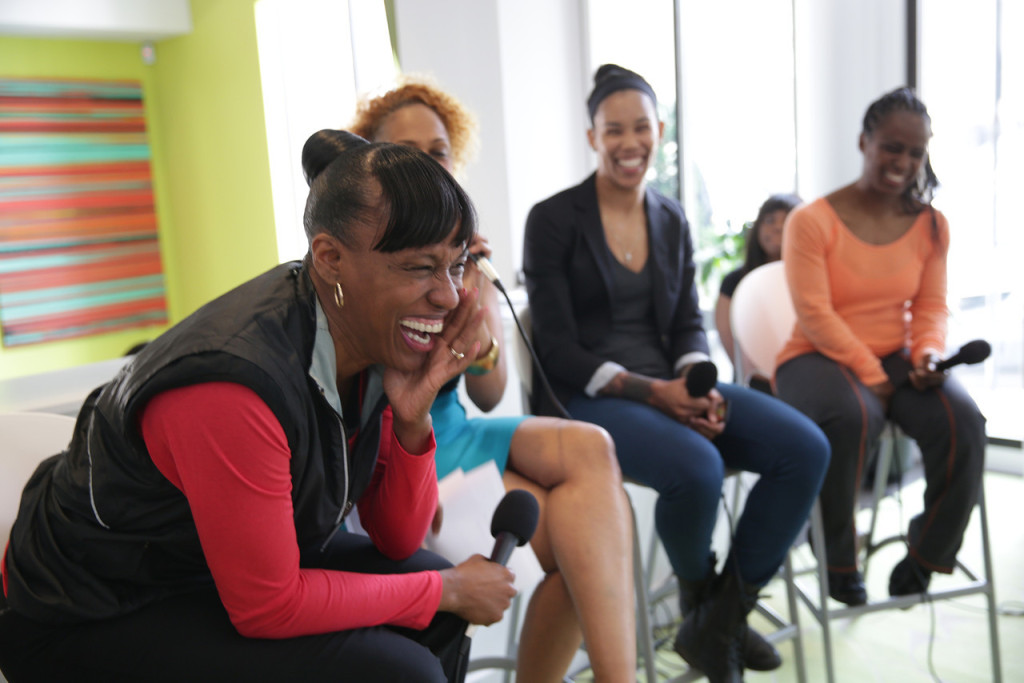
(Photo Credit: Robin Walker Marshall/Robin Lori Photography)
Title IX prohibits gender discrimination in athletic programs that receive federal funding. Enacted in 1972, the law grants women and girls equal access to the essentials necessary for becoming successful competitors such as scholarships and training facilities.
Three-time Olympic gold medalist Jackie Joyner-Kersee and Chicago Sky forward Tamera Young are two generations of black female athletes both highly affected by reform. They are instrumental in changing the scope of how female athletes in general are perceived by various publics. During a two-day Women’s History Month celebration at Atlanta’s Roc House Women’s Fitness Spa, Kersee and Young were panelists sharing their insights.
Both women discussed the importance of female athletes of color continuing to defy the norms in male-dominated competitive spaces. Kersee, one of track and field’s most versatile and well-known figures, is still the first and only heptathlete to score over 7,000 points. Accumulating the points in the 1988 Summer Olympics, the Hall of Famer also holds the indoor record for long jump.
Making sports history was beyond anything the determined East St. Louis, IL native could’ve ever imagined. “I didn’t envision growing up that I would become a world record holder or Olympic champion,” says Kersee. “I really just wanted to get on television. It was challenging, but I wanted to do it.”
One of Kersee’s coaches registered her to compete in the heptathlon for her age group. Excelling in varsity volleyball and basketball also, Kersee earned a full track scholarship to UCLA. Black female participation in the heptathlon was unheard of at the time. On the other hand, a down home Kersee was up for the challenge.
“Black girls wanted to be strictly sprinters, jumpers or hurdlers,” says Kersee. “Once I started educating myself and learning more about how to get the points, I saw myself developing. I knew I wouldn’t win all of the time, but I kept on. You can’t take a day off. Multiple events keep you humble and give you a real view that you have to work hard.” Knowing talent when she sees it, the iconic Olympian keeps a close eye on Georgia freshman pentathlete Kendell Williams, who was named SEC Freshman of the Year. “She’s very special,” says Kersee. “She has all of the tools to be one of the greatest.”
Kersee’s and Young’s careers weren’t without prejudice from men. Kersee remembers her coaches keeping her away from racist and sexist coaches from opposing teams. She and her teammates often traveled in groups and sometimes couldn’t go into certain places. “I always wanted to focus on the positive,” says an optimistic Kersee. “I realized that wasn’t gonna stop me from achieving, believing and working hard. There’s no substitute for hard work.”
And then there’s Young, a Hall of Famer at Wilmington, NC’s Laney High School (basketball legend Michael Jordan’s alma mater) who set the conference record as a member of James Madison University’s women’s basketball squad. The stellar WNBA athlete was drafted in the first round by the Atlanta Dream in 2008.
Young, who likes to take a moment of silence before she steps on the court, became the first player from JMU to accomplish pro eligibility. “People thought men were better athletes than women,” says Young. “We actually had to prove that we can do the same as men. It takes hard work, effort and heart. If you have heart, then you’re a champion.” Young immediately follows through with more encouragement. “My motto growing up was ‘Prove doubters wrong,’” she says. “Don’t let anyone tell you something that you can’t do. If you believe in yourself, have self-discipline and motivation, you can prove anybody wrong.”
Since Kersee retired in 2001, she’s concentrating on being a people’s champion. She founded a facility, Jackie Joyner-Kersee Center, to encourage youth in her hometown to actively participate in physical activity. In 1988, she founded a nonprofit organization, the Jackie Joyner-Kersee Foundation, to enhance the quality of life for families and communities. Recently inducted into the American Alliance for Health, Physical Education, Recreation and Dance (AAHPERD) Hall of Fame, Kersee co-founded Athletes For Hope with other notable sports figures to promote humanitarianism and sportsmanship throughout athletics.
Already the author of two books, Kersee would like to produce children’s books to educate young people on some of the obstacles she has encountered. One specific focus would be on her bout with asthma. Kersee’s transition into humanitarianism came from watching her coaches chaperone her teammates and ensuring they had someone to confide in and look after them.
“I didn’t realize at the time how that would impact my life later on,” says Kersee with her legs crossed. “No matter where my path would take me, I knew I would always come back in the community and help others. If you give the world the best you have, the best will come back.”
Even with both generations of women having amazing careers in sports, competition remains at the core of their identities. Kersee would like to see more females become heptathletes. More importantly, she wants to be remembered as an athlete who performed well on-and-off the track. “I want to be known for being a great human being,” says Kersee. Young, however, just wants people who have dreams to pursue them despite criticism or a lack of support.
“Any kid growing up that wants to dream or wants to believe they can do something, I wish the best for them and hope they keep their dreams alive,” says Young. “Don’t let anyone take it away. You’re built, not born, to be a winner and a champion.”
This post was written by Christopher A. Daniel, pop cultural critic and music editor for The Burton Wire. He is also a contributing writer for Urban Lux Magazine and Blues & Soul Magazine. Follow Christopher @Journalistorian on Twitter.
Like The Burton Wire on Facebook. Follow us on Twitter @TheBurtonWire.








